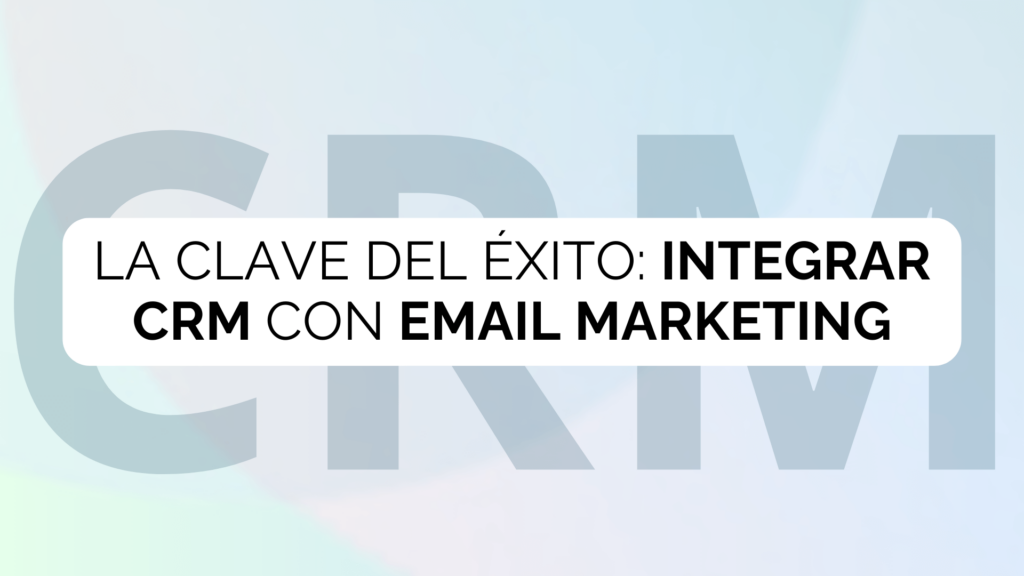The key to success: Integrating CRM with Email Marketing

On previous occasions in our blogwe talked about the importance of CRM in personalisation and multi-channeling. We are well aware that personalisation is becoming one of the most important challenges for all companies that want to get the most out of their digital marketing actions.
Thus, Integrating your email marketing platform with a CRM allows you to centralise all your contact information in one place, providing a complete and detailed view of each customer or lead.. This includes interaction data, behaviours, purchase history, preferences and more.
When this information is synchronised, you can better manage your marketing campaigns, personalise communications and automate follow-up tasks without losing sight of any important details.
What are the benefits of integrating CRM with Email Marketing?
Unified customer view. By integrating your CRM with your email marketing tool, all relevant information about your customers in one place. Therefore, you can see, in real time, how they interact with your mailings, which products they have purchased, which pages they have visited on your website, and which emails they have opened or ignored.
Thus, one could say that having a unified view allows you to create much more comprehensive customer profilesThis makes it easier to segment your campaigns and personalise your messages.
Precise segmentation. Another benefit is that it allows us to use the CRM data to segment your contact lists more precisely. You can create segments based on specific behaviours, such as past purchases, geographic location or recent interactions with your emails.
Segmentation improves the relevance of your emails and increases open and conversion rates, as you are sending highly personalised messages to each group of users.
Task automation. Another benefit we get from CRM integration, is that you can automate many tasks within your email marketing strategy. For example, when a lead progresses in the SALES FUNNELIf you want to send a follow-up email or a personalised offer, your CRM can trigger the automatic sending of a follow-up email or a personalised offer. In other words, this automation not only saves time, but also ensures that leads receive the right content at the perfect time.accelerating the sales cycle.
Multi-channel campaign coordination. Integrate email marketing with CRM and other tools, such as social media or advertising platforms, allows you to better coordinate your campaigns across different channels.. You can send a reminder email, followed by a social media post or a personalised ad based on customer behaviour. Therefore, we can say that this action ensures that your campaigns are aligned and consistent across all touchpoints, which increases your brand visibility and improves the customer experience.
Real-time measurement and analysis. On this last point, we can track the real-time performance of your campaigns. Data such as open rates, clicks, conversions and ROI are integrated directly into your CRM, giving you a clear view of what's working and what needs tweaking. So, with this information at hand, you can make more informed decisions, optimise your campaigns and adjust them on the fly for better results.
How to achieve good integration?
To get the most out of email marketing and CRM integration, it is essential to choose tools that synchronise effectively. Some of the most popular platforms for these integrations are:
- HubSpot: One of the most complete solutions, it allows you to easily integrate email marketing campaigns with CRM, social media and more.
- Salesforce: This CRM is known for its ability to integrate multiple marketing platforms, including email marketing tools such as Mailchimp or Pardot.
- Zoho CRM: It offers native integration with various marketing platforms and automation tools to maximise campaign efficiency.
Here is a post by Holdedwhich contains a comparative table of Top 10 best customer management or CRM software in 2024.
In addition to choosing the right tools, it is important to ensure that the integration process is simple and efficient. This includes correctly configuring the data flows between the CRM and the email marketing platform, making sure that the contact lists are well segmented, and establishing triggers automatic for specific events, such as purchases or email interactions.